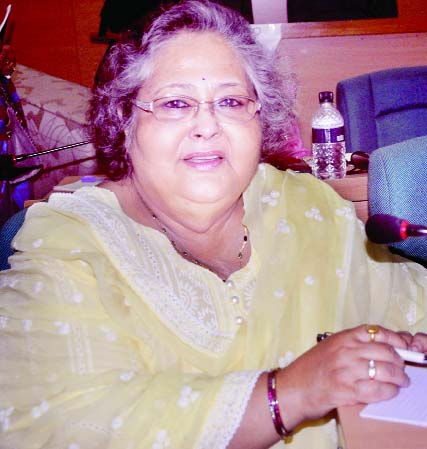
Staff Reporter :Chandni Joshi, Eminent Women Rights Activist of Nepal, has said that Bangladesh made a remarkable progress in women empowerment and gender equality compared to neighboring India and Pakistan.Laying emphasis on women empowerment, she said: “The government of Bangladesh has to take into consideration that 50 pc of the population are female. And without ensuring the dignity and justice of women, the country cannot move forward in any positive direction.” Chandni Joshi, Regional Director of UNIFEM [United Nations Development Fund for Women] in South Asia, who is now in Dhaka to attend an international conference, has also, expressed her opinions over gender equality in an exclusive interview with The New Nation on Sunday. The feminist leader said that she has been visiting Bangladesh for the last 15 to 20 years but the progress this year is quite remarkable. Question: What can be done to improve current scenario on gender equality in Bangladesh? Joshi: Gender sensitivity among policy makers and simplification of women rights laws is very important in this regard. Laws should not be written in books for keeping in shelf but the entire judicial system as well as law enforcing bodies like police and RAB must play an active role in implementing laws.”Question: What about the overall progress in general equality? Joshi: The world has not improved much for women and girls. It is disheartening to hear that for some it has got a lot worse. It is still difficult to believe that last month, the UN document ‘Political Declaration’ signed by 167 countries still admit the same barriers and constraints which we recognized 20 years back are still prevalent and in force globally.…..There is no doubt that there are bright highlights of progress but it is very sad to note that “no country” has yet achieved gender equality.Question: What are the barriers? What do you think?Joshi: If we properly analyze the progress in gender equality it has been held back by persistent conflicts, the global financial and economic crisis, volatile food and energy prices and climate change. These have had negative impacts on women and girls. These dimensions of gender equality continue to be threatened by rising extremism.Question: Why and how does violence against women occur?Joshi: This is not confined to a specific culture, region or country. It cuts across caste, class, race, religion and sex. The roots of violence against women lie in historically unequal power relations between men and women. VAW [violence against women] has been used to shame families and nations. Rape has been used as a weapon of war. “A life cycle of discrimination and violence girls and women face from womb to tomb, they are at risk of experiencing violence throughout their lives. Millions of girls are deprived of being born due to sex selection abortion, which is an important manifestation of the persistence of a preference for sons. The number of feticide and infanticide only in India is very alarming and similar scenario prevails all over South Asia.”Question: What is the actual scenario? Have you got any data? Joshi: About 4.5 million people are victims of forced sexual exploitation 98% are women and girls, 1 in 3 women worldwide have experienced physical or sexual violence. 700 million women alive today were married before the age of 18 and over 10 million children are exposed to domestic violence. Another horrific data is every 9 seconds a woman is beaten in the U.S and every 6 minutes a woman is raped in U.K. Every 4 minutes a woman is kidnapped, every 7 minutes a criminal offence takes place, every 10 minutes a woman is burnt to death over dowry, every 26 minutes a woman is molested. 35% of women worldwide have experienced physical or sexual violence in their life time. 75% of battered women try to commit suicide. Along with this, 40 to 45 million women and girls go missing every year. Most alarming information is that majority of women who face violence do not even report. So we can imagine how these numbers will be multiplied if all cases are reported.Question: How can we improve the situation?Joshi: Gender equality, women’s empowerment and realization of women’s and girl’s human rights are fundamental for achieving human rights, peace and security and sustainable development and this must be central to the post 2015 Development Agenda. The Beijing +20 debate has set 2030 as the expiry date for gender equality. If this has to be achieved we need to take some baby steps ourselves too. Earlier, Chandni Joshi attended the “International Conference on Gender, Diversity and Development” held in Senate Hall of Dhaka University where she voiced that different indicators of progress in women rights as well as gender issues show that Bangladesh has made noted improvement in female education, development of female work force and also in equal treatment of women in house arenas. In a three day long conference, Joshi was full of enthusiasm that the women in Bangladesh are now more vocal and can speak out openly about any type of physical, sexual, financial violence and harassment against them compared to previous years. Joshi was formerly Joint Secretary and Chief of Women Development Division, Ministry of Local Development in the Government of Nepal. Currently, she had been nominated by all eight SAARC member nations as the Advisor for SAARC Gender Information Base.

